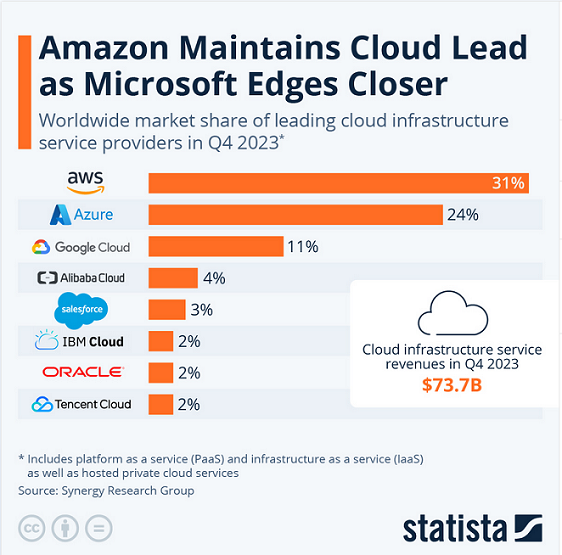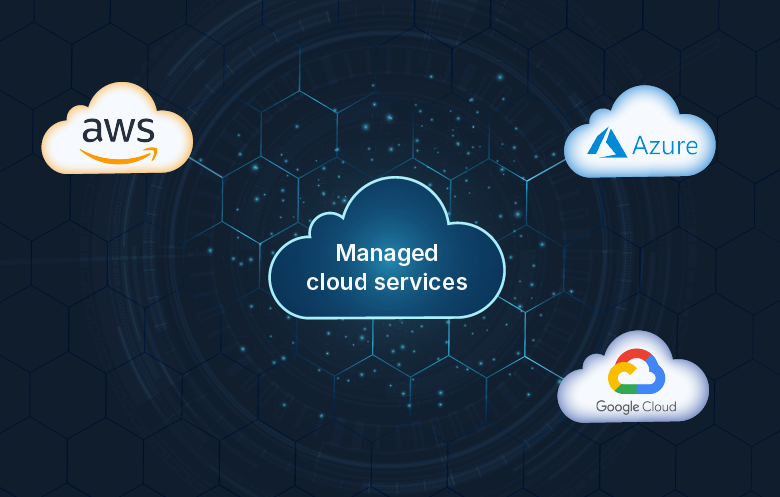Every organization wants the perfect balance of performance, security and price, yet no two cloud platforms deliver the same mix. With so many cloud providers in the market, choosing the right platform isn’t easy. Each cloud provider, AWS, Microsoft Azure, Google Cloud Platform (GCP), Salesforce Cloud, has its own strengths, unique features, and a few trade-offs. Which cloud platform suits your business best depends on your business requirements.
More than half of enterprise IT spending in key market segments will shift to public cloud services by 2025, up from approximately 41 percent in 2021. – Gartner
In this blog post, we’ll explore the top global cloud service providers, what sets them apart, and how their capabilities align with your business goals.
What is a cloud service provider?
A cloud service provider is a third-party company that offers scalable, on-demand computing resources such as storage, databases, infrastructure, and servers. The cloud service provider allows businesses and individuals to access these computing resources over the internet, rather than needing to manage their own physical infrastructure.
Who are the top four market players in cloud services?
Amazon Web Services (AWS), Microsoft Azure, Google Cloud Platform (GCP), and Salesforce Cloud are the top cloud service providers with the largest market share, collectively capturing over 65% of spending on cloud infrastructure services.

Source: Statista
Data of cloud services delivering real business value
- 82% of companies enhanced cooperation and communication.
- 61% of the firms improved the efficiency and effectiveness of their business processes.
- 70% of IT leaders believe a hybrid cloud strategy enables successful digital transformation.
- 70% of organizations adopt cloud solutions to safeguard data during disasters.
- 48% of businesses store their most important data in the cloud.
As we have learned about the top four cloud service providers in the market and have also investigated some data that signifies the need for cloud services for the modernization of business. Now let’s understand which cloud service provider can best fit your business requirements.
AWS Vs. Azure Vs. GCP Vs. Salesforce Cloud
| Cloud Provider | Best For | Strengths | Challenges |
|---|---|---|---|

|
|
|
|

|
|
|
|

|
|
|
|

|
|
|
|
Top 11 cloud service providers in 2025
The cloud industry is dominated by four top players—AWS, Azure, GCP, and Salesforce Cloud. While these giant cloud service providers are the best fit and are covered in detail, we’ve also highlighted other strong contenders offering reliable and scalable cloud services for various needs and budgets.
Let’s start with the four leading cloud service providers.
1. Amazon Web Services
AWS is a complete cloud computing environment offered by Amazon. It provides instant access to computing resources, storage, and databases and enables deployment and development of applications without physical infrastructure.
Benefits
- Easily scalable based on demand, optimize performance and cost
- Pay-as-you-go model ensures you only pay for the resources and services you use
- End-to-end encryption and strong security policies ensure that data and infrastructure are safe and protected.
- Highly flexible, as it offers a wide range of tools and services that can be easily combined to build and deploy a variety of applications
Features
- EC2 services offer virtual servers in the cloud, enabling organizations to scale their computing requirement as their business grows
- S3 offers object storage, and EBS offers block storage, catering to diverse data storage needs
- EC2 Auto Scaling and Fleet help businesses optimize costs and scale their infrastructure efficiently.
- Virtual private cloud allows businesses to create isolated networks within the AWS environment
Popular services
- Amazon EC2 (Elastic Compute Cloud): Scalable virtual servers for flexible cloud computing
- Amazon S3 (Simple Storage Service): Durable object storage with infinite scaling potential
- AWS Lambda: Run code automatically, no servers required to manage
- Amazon RDS (Relational Database Service): Manage relational databases with high availability built in
- Amazon DynamoDB: Offer single-digit millisecond latency with NoSQL database
- Amazon VPC (Virtual Private Cloud): Create isolated network environments in the cloud
When to choose AWS
Businesses should choose Azure as a cloud platform when they are looking for:
- Run virtual servers to handle changing workloads anytime, anywhere
- Store and retrieve unlimited data with high availability and durability
- Set up, operate, and scale relational databases in cloud
- Distribute content worldwide with low latency and high transfer speeds
Pros
- Provides high availability and low latency for applications worldwide
- Offers managed services for various aspects of cloud infrastructure, reducing the burden on users
- Enables a user-friendly interface for improved usability and managing services
- Allows users to easily adjust their resources based on demand
Cons
- Vendor lock-in risk with deep integration into AWS ecosystem
- Service limits may require manual increase requests during scaling
- Support plans can be expensive for critical issue resolution
2. Microsoft Azure
Microsoft Azure is a wide-ranging cloud computing platform that provides an extensive array of services for application building, deployment, and management. It supports solutions for computing, analytics, storage, networking, and AI, enabling companies to monitor and scale applications across the world.
Benefits
- Provides comprehensive security measures, including advanced threat protection and encryption
- Scales resources by adapting to the growing demands
- Connects on-premises resources seamlessly with the cloud, providing flexibility and agility
Features
- Build AI and machine learning models with powerful cloud tools
- Monitor applications in real-time with Azure Monitor and Insights
- Include built-in monitoring through Azure Monitor and Log Analytics tools
- Support role-based access control across all Azure services securely
Popular services
- Azure Virtual Machines: Run scalable virtual servers for any workload
- Azure Storage: Offer secure cloud storage for all data
- Azure Active Directory: Centralize identity management with secure access control
- Azure SQL Database: Manage relational database with built-in intelligence
- Azure Cosmos DB: Distribute NoSQL database globally for fast access
- Azure DevOps: Provide services for software development and DevOps practices
When to choose Azure
Businesses should choose Azure as a cloud platform when you need to:
- Store unstructured, backup, or archive data reliably and securely
- Manage user identities and enabling secure, single sign-on
- Run managed, relational databases with minimal maintenance overhead
- Build globally distributed applications with real-time data access
Pros
- Enables businesses to access applications and data from anywhere
- Offers advanced analytics tools and AI services that help businesses extract insights from data
- Facilitates hybrid cloud environments, enabling organizations to combine on-premises resources with cloud services
Cons
- Struggles with inconsistent documentation across some advanced Azure services
- Delayed customer support for non-enterprise-tier users
- Heavily depends on Microsoft ecosystem, limiting cross-platform flexibility sometimes
3. Google Cloud Platform (GCP)
Google Cloud Platform, or GCP, is a collection of cloud computing products developed by Google that delivers a broad set of tools and technologies for computing, storage, networking, big data, machine learning, and more. It aims to assist developers and companies in creating, deploying, and managing applications efficiently and cost-effectively.
Benefits
- Allows users to scale their applications, providing flexibility and cost savings
- Provides access to cutting-edge technologies like AI, machine learning, and big data analytics
- Ensures high performance and low latency with a global network of data centers
- Built with robust security features, including industry-leading compliance standards and data encryption
Features
- Executes event-driven code using lightweight, stateless serverless functions
- Deploys and manage containerized applications with Kubernetes orchestration
- Offers serverless SQL analytics through a fully managed data warehouse
- Uses multi-region data centers for high availability and redundancy
Popular services
- BigQuery: A data warehousing service for analyzing large datasets
- Cloud storage: A scalable and secure object storage service for any data type
- Cloud functions: A serverless computer service for building and deploying event-driven applications
- Kubernetes engine: A managed Kubernetes service for deploying and managing containerized applications
- AI platform: A platform for building and deploying machine learning models
When to choose GCP
Businesses should choose Google Cloud Platform as a cloud platform when they need to:
- Handle large datasets and perform complex queries
- Deploy machine learning models and open-source tools, and frameworks
- Build and manage containerized applications efficiently
- Achieve low latency and high availability, especially important for applications that need to be accessed globally
Pros
- Offers various pricing models, including committed use discounts and sustained usage discounts, which can help optimize costs
- Allows developers to easily integrate popular open-source technologies and languages
- Streamlines development and operations workflows, increasing efficiency
- Facilitates quick collaboration among users working from different locations, allowing real-time project access
Cons
- Complex to use, particularly for users new to cloud computing
- Limited support offerings can potentially impact issue resolution
- Fewer global data centers than AWS or Azure, potentially impacting performance
- Lacks vastness in services and features like AWS or Azure
4. Salesforce Cloud
Salesforce Cloud is a suite of cloud computing-based software packages that allow businesses to run all their customer relationships, marketing, sales activities, and other business processes in a single cloud-based system. Salesforce Cloud offers businesses the ability to scale, flex, and customize, allowing businesses to leverage the platform to their own requirement.
Benefits
- Enables businesses to manage their sales processes, track leads, and close more deals
- Builds stronger customer relationships by centralizing customer data and providing tools for communication
- Automates tasks, provides real-time data, and enables access from anywhere, boosting productivity
- Offers powerful analytics and reporting features, allowing businesses to track performance and make data-driven decisions
Features
- Includes AI-powered Einstein tools for predictive analytics and insights
- Supports multi-channel customer engagement via email, social, chat, and mobile
- Facilitates secure role-based access with granular permission controls
- Provides robust APIs enabling extensive third-party app integrations seamlessly
- Delivers real-time dashboards and reports for comprehensive data visualization
Popular Services
- Sales cloud: Manages sales processes and customer interactions
- Service cloud: Provides customer support and self-service options
- Marketing cloud: Automates marketing campaigns and engaging with customers
- Commerce cloud: Manages online e-commerce businesses
When to choose Salesforce Cloud
Businesses should choose Salesforce cloud services when they need to:
- Centralize platform for managing customer relationships
- Improve their sales processes and close more deals
- Streamline customer support and provide self-service options
- Automate marketing campaigns and engage with customers more effectively
Pros
- Adapts to changing business needs and growing organizations
- Connects with other business systems and applications
- Provides a single source of truth for customer data and interactions
- Accessible from any device with an internet connection
Cons
- Highly dependent on cloud infrastructure raising privacy and security concerns
- Time consuming as high expertise are required for implementation
- Expensive for larger businesses with complex needs
- Complex platform to learn and manage
Let’s explore other leading cloud service providers.
Here are the competent cloud service providers that provide a variety of solutions for companies in various industries. They supplement the big players with specialized offerings and flexible deployment.
5. IBM cloud platform
IBM Cloud is a versatile cloud computing platform that offers the most open and secure public cloud platform for businesses that are in search of next-generation hybrid cloud solutions and advanced AI capabilities. With IBM Cloud, businesses can create hybrid platforms that bring scalability and flexibility to the applications and data that run in their secure private cloud.
6. Oracle cloud infrastructure (OCI)
Oracle Cloud Infrastructure (OCI) is a public cloud platform that provides a broad set of services for developing and deploying applications in a scalable, secure, and high-performance environment. One of its strong points lies in its emphasis on performance, utilizing innovative networking, computing, and storage offerings.
7. Alibaba cloud
Alibaba Cloud is a world-leading cloud solution and artificial intelligence services provider with a suite of tools for businesses and developers. Among its key strengths are its affordable pricing schemes, extensive AI capabilities, and high-capacity infrastructure designed to manage high-scale workloads, making it a robust competitor in the cloud market.
8. SAP cloud
SAP Cloud offers a wide range of cloud-based services—from ERP and analytics to tools for application development. What sets it apart is how seamlessly these services work together. Its strength lies in integration—giving businesses a modular ERP suite and AI-driven tools that work together to support every department.
9. VMware cloud
VMware Cloud is a complete and integrated set of cloud services that enables businesses to extend and manage their current on-premises VMware infrastructure to the cloud. The solution has enabled improved management, utilization of resources, as well as security and analytics with tools such as network segmentation and analytics.
10. Huawei Cloud
Huawei Cloud is a one-stop cloud platform by Huawei, focusing on enabling enterprises undergo digital transformation. It has several key strengths, such as its security, reliability, and global accessibility, with many data centers and compliance certifications. Huawei Cloud also touts itself as an expert in telecommunication space, providing distributed cloud architecture and solutions.
11. DigitalOcean
DigitalOcean is a cloud hosting platform that is centered on offering Infrastructure as a Service (IaaS) to developers, startups, and small and medium-sized enterprises. Some of the main strengths are its developer-driven model, strong community support, and open pricing with no extra fees.
Make smarter cloud decisions that align with your business goals
The global cloud landscape is enormous, but success lies in how well a provider meets your specific regional, regulatory, and operational needs. This list of top providers highlights the diversity of offerings, reflecting the dynamic nature of the market. Choosing the right provider depends on aligning their capabilities with your specific business needs. As cloud technology continues to evolve, staying informed and adaptable will be key to enhancing the potential of the business.
FAQs
1. Which is the best cloud service provider in 2025?
There are four best cloud service providers leading the market. Amazon Web Services (AWS) and Microsoft Azure are the dominant cloud service providers, holding the largest market share. Google Cloud Platform (GCP) and Salesforce Cloud are also significant players with growing market shares. While these giants dominate the market, other providers like IBM Cloud, Oracle Cloud, and Alibaba Cloud offer their own competitive advantages. Choosing the right cloud service provider depends on aligning their capabilities with your business goals.
2. What are the main differences between AWS, Azure, and Google Cloud Platform?
All three provide computing, storage, networking, security and global datacenters, yet each excels in different domains. AWS is known for its broad and deep service offerings, while Azure excels in hybrid cloud and integration with Microsoft products. GCP is known for its strong data analytics and machine learning capabilities.
3. What factors should companies consider before selecting a cloud provider?
When choosing a potential cloud service provider companies should look for strong security, compliance regulation, cost, scalability, and customer support. Ask for providers’ certifications, industry standards they follow, and data protection measures that are crucial for ensuring a secure and reliable cloud environment.
4. Can businesses use multiple cloud providers at the same time?
Yes, businesses can hire multiple cloud providers at the same time. This is known as a multi-cloud strategy. This approach involves leveraging services from different cloud vendors to meet various business needs, rather than relying solely on a single provider.




